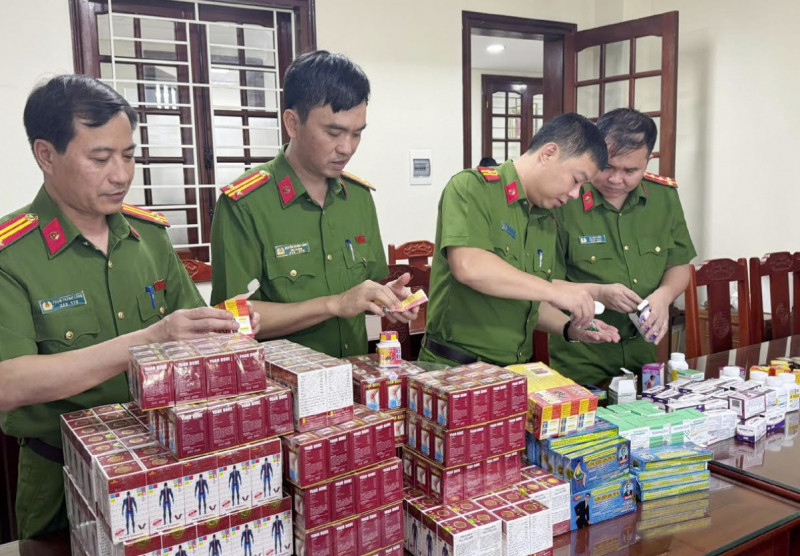Authorities in Ho Chi Minh City and Hanoi have uncovered numerous cases of pharmacies selling counterfeit or untraceable drugs, sparking public concern. However, the fines imposed are often so low that they fail to deter repeat violations.
Pharmacies selling fake or untraceable drugs

On June 4, 2025, the Ho Chi Minh City Department of Health announced that it had fined 18 pharmacies for serious violations, including selling drugs of unknown origin or without market authorization or import permits. Notably, Funny Pharma Pharmacy (District 1) was caught selling untraceable medications, including commonly used antibiotics such as Cefixim and Augmentin 625. Minh Khang Pharmaceutical Company’s pharmacy (District 10) was ordered to destroy 20 types of drugs of unknown origin.
In Hanoi, authorities previously discovered that Duc Anh Pharmacy (No. 8 Huynh Thuc Khang Extension, Dong Da District) had been selling counterfeit Nexium 40mg (Esomeprazole) for stomach ailments and Diamicron 60mg (Gliclazide) for diabetes.
At the same time, Hanoi’s Center for Drug, Cosmetics and Food Testing found that the Theophylline Extended Release 200mg at An An Pharmacy (Ha Dong District) lacked a Vietnamese-language label and was not registered for circulation, in serious violation of labeling regulations.
In 2024, government testing agencies sampled over 43,000 pharmaceutical, herbal, and cosmetic products on the market for quality testing. Of these, 228 samples failed to meet standards, including 98 pharmaceutical drugs. The proportion of counterfeit drugs ranged from 0.04% to 0.06% - a small number but one that carries significant risks.
Among the 23 suspected counterfeit samples, 11 were traditional medicine products laced with pharmaceutical ingredients such as paracetamol and diclofenac without proper labeling. Common counterfeit substances included cefixim, cefuroxime, mebendazole, salbutamol, and tetracycline - essential drugs used to treat bacterial infections, asthma, and parasitic diseases.
High risk, low penalties: Are current fines enough to deter violations?
During a Ministry of Health meeting in May with various ministries and local agencies regarding counterfeit drugs, cosmetics, and supplements, Deputy Director of the Drug Administration of Vietnam, Ta Manh Hung, stated that one of the reasons counterfeit drugs continue circulating is the lack of strict penalties.
For instance, the value of a fake drug box might only be a few hundred thousand VND, so under Decree 117, administrative fines typically range from a few to several million VND.
In the case of Ho Chi Minh City, the Nguyên Khoi Pharmacy (Cu Chi District) was fined just 800,000 VND (approximately USD 31) for selling untraceable drugs.
Minh Chau Mot Tam Pharmacy (District 6) sold 10 types of untraceable drugs but received only a USD 1,250 fine.
The largest fine issued during the recent inspection was USD 5,870 against Minh Khuong Trading Co., Ltd. (District 1), a figure considered disproportionately low given the seriousness of the offense.
The dangers of counterfeit drugs go far beyond ineffective treatment - they can threaten lives.
Speaking to VietNamNet, Dr. Doan Du Manh from the Vietnam Society of Vascular Diseases warned that fake drugs can mask symptoms, allowing diseases to worsen unnoticed.
Many counterfeit medications are crudely produced, mixed with unidentified herbs, dyes, and even heavy metals, leading to liver, kidney, and neurological damage over time.
Fake joint pain medications often contain high doses of corticosteroids, which may offer quick pain relief but can cause severe complications such as adrenal insufficiency, hypertension, diabetes, and even heart failure.
With counterfeit antibiotics like Cefixim and Tetracycline, patients face the risk of uncontrolled infections, potentially resulting in pneumonia, sepsis, or even death.
VietNamNet reader Bui Xuan Dung suggested that any pharmacy selling drugs of unknown origin should be investigated by law enforcement to determine whether the drugs are smuggled or part of a counterfeit network, and strict legal action must be taken.
Reader Chu Van Huy argued that any instance of selling untraceable drugs should result in criminal prosecution to track down the source of production and supply. Fake drugs pose a direct threat to public health and must be dealt with severely.
He also proposed that the Drug Administration of Vietnam enhance oversight of the supply chain and require pharmacies to maintain detailed invoices and strictly comply with traceability regulations. Public awareness campaigns should be expanded to help consumers identify counterfeit drugs by checking labels, registration numbers, and only purchasing from reputable outlets.
Authorities are also urged to adopt technology such as QR codes for origin tracing to ensure greater transparency.
“The fight against counterfeit drugs is difficult and long-term. It requires the full engagement of the political system, along with vigilance and cooperation from the public,” said Deputy Director Ta Manh Hung.
Phuong Thuy